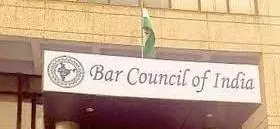
BCI urges state bar associations not to protest against new criminal laws
text_fieldsNew Delhi: Bar and Bench reported that the Bar Council of India on Wednesday asked bar associations throughout the nation to abstain from protesting against the three new criminal laws that will take effect on July 1.
In December, Parliament passed the three new criminal bills. The Indian Penal Code from the colonial era will be replaced by the Bharatiya Nyaya (Second) Sanhita, the Code of Criminal Procedure by the Bharatiya Nagarik Suraksha (Second) Sanhita, and the Indian Evidence Act by the Bharatiya Sakshya (Second) Bill.
The Bar Council of India announced on Wednesday that a number of bar associations had hinted they would stage ongoing protests if the new legislation weren't stopped.
According to the statement, the bar associations have requested in-depth national discussions, as well as a full review of the three bills by Parliament, as reported by the Bar and Bench. According to Live Law, the West Bengal Bar Council declared on Wednesday that it would commemorate 1 July as "Black Day," denouncing the three new criminal laws as anti-people, undemocratic, and likely to severely harm civilians.
The state bar council members announced that on July 1, lawyers in West Bengal and the Andaman and Nicobar Islands would not perform any judicial work in order to organise protests, scroll.in reported.
On Wednesday, however, the Bar Council of India declared that it would communicate the concerns of the legal community to the Union government.
“The Bar Council of India assures the Bar Associations and the legal fraternity that these issues are being taken seriously and there is no cause for immediate concern,” it said. “Consequently, there is no immediate necessity for agitation, protests, or strikes in relation to this issue.”
In order to start a dialogue with the Union administration, it also asked all bar associations and senior advocates to submit specific provisions of the new laws that they believe to be unconstitutional or harmful.
Union Home Minister Amit Shah stated that the three new legislation would "end three colonial laws" that currently regulate India's criminal justice system and provide criminal laws "by Indians, for Indians" when he introduced them in Parliament in August.
Following the suspension of 100 Opposition MPs in the Lower House and 46 in the Upper House during a part of the Winter Session for allegedly interfering with the proceedings as they sought a discussion on the December 13 security breach in the Lower House chamber, the bills were passed in Parliament.
The new regulations make it harder to obtain bail and submit first information reports, and they extend the state's authority to gather personal information and seize property. Additionally, they toughen the penalties for offences like terrorism, lynching, and harming national security.
A group of 109 retired civil servants also requested on June 21 that the Union administration postpone the enforcement of the new criminal laws and make sure that an all-party meeting be held to discuss them.
They further claimed that the laws regularise extraordinary power “which should normally be available only in legitimate states of emergency as already provided in the Constitution”. “The effect of these laws, as currently approved, is that, once they come into effect, India will no longer be a functioning democracy,” wrote the former civil servants.























